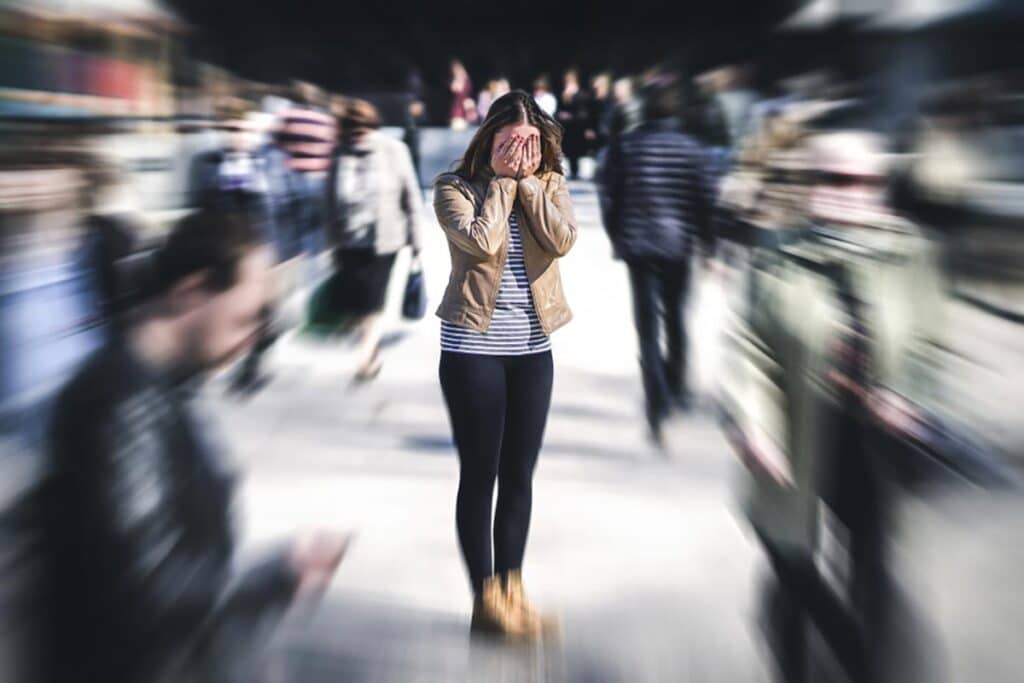A little while ago I had one of those days where I just couldn’t win: My wife had just left for a 10-day work trip. My brother had just arrived from overseas to visit my mom.
My son was home sick with Covid. I finished a work call and found the front door wide open, the dog had gotten out. I had 15 minutes to find her before I had to host a zoom call with 250 people. And did I mention I also had Covid?

Now this isn’t the first time this has happened. In fact, our dog has gotten out frequently enough that we bought Apple airtags to make finding her easier.
But, of course, the air tags had fallen off somewhere on the sidewalk earlier in the week (and while it’s not so hard to find a 50-pound dog wearing an air tag, it’s much harder to find the air tag itself in the great outdoors).
I could feel the anxiety rising. And then… I calmed down. Because I realized that the last time this happened, she had gone to the alley behind our house. I decided that was the place to start. I got in the car, drove around the corner, and sure enough, there was Phoebe eating out of a dumpster behind our local Dunkin Donuts.
Someone’s watching Ben Affleck commercials, I see. I got out, leashed her up, put her in the back seat, and even brought home a half-dozen Boston creme pies for us to enjoy. I guess I’ve also been influenced.
When the zoom call was over, and we were all feeling better, and life was a little more back to normal, I finally got a chance to reflect about this day, and I asked myself two questions that seemed basic, but were actually really important.
1. What brought about my anxiety? And 2. What helped me calm down? A big part of what contributed to my nervousness was a feeling of not knowing: Where is the dog? How long is it going to take to find her? Am I going to make it back on time for that big zoom call?
And a big part of what calmed me down was realizing that I knew more than I thought — she’s probably in the alley vand I therefore had more control than I initially imagined.
That feeling of not knowing can be really hard. Just ask the ancient Israelites. You might remember that part of the Torah in which our hero, Moses, is away for 40 days and 40 nights on Mount Sinai, receiving the Torah from God.
And while he’s gone, in the Torah portion of Ki Tissa, the Israelites get anxious and freak out. “We don’t know what happened to Moses!” They pressure Aaron, Moses’s brother, to build an idol for them. They melt down their jewelry and produce a golden calf, and they proclaim — with relief — “This is your god who took you out of Egypt!”
When Moses gets back, he smashes the tablets with the Ten Commandments on them that he just received from God, civil war ensues, thousands of people die, God gets really pissed — it’s a bad scene.
The great medieval commentator Rashi imagines that the not-knowing that set off this whole firestorm was a misunderstanding about the exact date and time Moses would return.
The people thought he would come down from the mountain on one day, but Moses was really coming down the following day.
Like little children whose parents came home later than expected, they got anxious. What they thought they knew — a fundamental issue of security in their lives — turned out not to be true in the moment. No wonder they lost it.
But in thinking about my own sense of panic, I think there’s a deeper message here, and it goes to something fundamental in mindfulness practice. As a friend of mine, Raffi Stein-Klotz likes to say, it’s important to “always never know.”
That is, one of the things we practice through Jewish mindfulness is being comfortable with the uncertainty that arises from not knowing for sure. We always never know.
Our desire for certainty can make us feel anxious when we don’t have it, and it can cause us to do some harmful things — erect idols, lash out in anger, and even worse — to try to attain it.
So the practice I’d like to invite you to do this week is to use this phrase of Raffi’s, Always Never Know, as a kind of mantra or focus phrase. You might write it down or print it out and put it in a place you’ll see it regularly. You might practice saying it during meditation.
You could try saying it slowly to yourself ten times during your morning or evening routine (or both!) However you choose to engage with it, see what happens when you allow these words to really make a groove on your mind and heart.
Perhaps you’ll feel a little less anxiety the next time you’re in a tense situation. Maybe you’ll give yourself an extra beat or two before you respond. And maybe that little dose of time and space will support you in making a wiser choice — a choice with less anxiety about the things you don’t know, and more trust in the things you do.
Blessings for the journey. Know that I’m on it with you.

